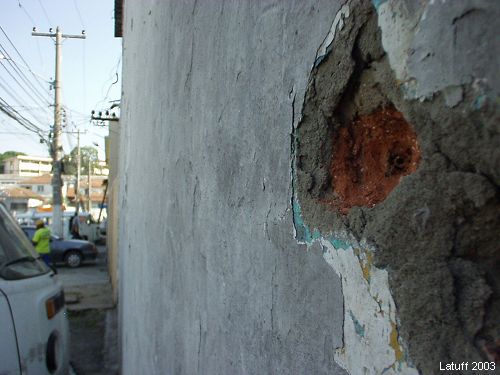|
Gil Gafree: Bullet-riddled street (by Latuff) by Latuff Sunday June 29, 2003 at 05:35 PM |
| latuff@uninet.com.br |
Complete photo essay at http://prod.midiaindependente.org/pt/blue/2003/06/256587.shtml

gilgafree3.jpg, image/jpeg, 500x375
GIL GAFREE: BULLET-RIDDLED STREET
*by Latuff
If one is walking, driving a car, bus or bicycle by the Avenida dos Democraticos, in the neighbourhood of Bonsucesso, Rio de Janeiro, one almost certainly will not notice a cul-de-sac called Rua Gil Gafree. There are a few houses, a kindengarden, an office, a bar and an evangelical church. Nothing extraordinary, until you look intently at the walls of the afore
mentioned places. Most of the buildings have bullets marks, thanks to the shoot outs between the drug traffickers and the police. One of the entrances of Favela de Manguinhos is
through Gil Gafree cul-de-sac.
You walk on the side walk and you can count the holes, one, two, three, twenty. There are bullet holes on the lamp posts, gates, water thanks, roofs even a Volkswagen Kombi show signs of gun battle. The locals have normalized the bullets in the walls, however they find strange my interest in taking fotos of the bullet marks.
I remember now that anyone can buy in newstands, adhesives with bullet marks to fake bullet holes to place in vehicles.
Bullets are a new fashionable trend in Rio.
Military weapons are used in the confrontation between police and drug traffickers. This type of weapons use high speed bullets that destroy brick walls as if they are made out of card box paper. I was not surprised when I first saw these conditions; I had already seeing photos from Angola and Somalia. But it's not the same thing. We are not experiencing a civil war. When there is a conflict of ideological, ethnic or religious nature, peace cannot be easily bought.
Here it's a very different cause. We are facing here the laws of the free market. In order to sell drugs there is a need to destroy the barriers that stop the free movement of the
goods(drugs), between the producer and the consumer. There is always the possibility of an amicable arrangement, when money to exchange hands. A cease fire can be arranged if certain people can be bought. Some money for the commandant of the battalion, some for the member of the legislature, some for the secretary of state responsible for security and peace will follow. When this agreement is broken the machine-guns sing. Therefore the shoot outs between drug dealers in favelas and the police is a direct result of broken contract between the state (police) and the criminals.
Police and drug dealers complement each other, because one justifies the existence of the other. The drug dealer makes money by selling; the cops make money from the drug traffickers, the weapon merchant sell illegal weapons to both, the authorities make money in order to facilitate this process and everyone is interconnected by an umbilical cord called corruption. There is always money flowing to someoneâ s hand. The loosers are the inhabitants of the favela in Manguinhos and any other favela in Rio or Brazil.
For the people living in the favelas the only thing they get from this arrangement, between the cops and drug dealers, are bullets!
*Latuff is a Brazilian cartoonist and he is grateful for the co-operation of the community of Vila Turismo in Manguinhos, whose help was essential in making this photo essay. Thanks also to my sister-in-arts Regina, who made translation from Portuguese to English.
